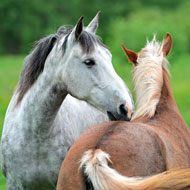Researchers develop saliva tapeworm test

"Horse owners will be able to purchase saliva collection kits through distributors and collect the saliva sample themselves".
Researchers at Austin Davis Biologics have developed a saliva test to diagnose tapeworm burden in horses.
Writing in the journal Veterinary Clinical Pathology, researchers say the test could be more cost-effective and allow for targeted deworming strategies.
Speaking to The Horse, study author Corrine Austin said: “A limited number of drugs are available for treating equine helminths (worms) and, with no new chemical classes (drugs) in development, care must be taken to preserve the efficacy of the currently effective anthelmintics.
“The use of accurate diagnostic tests to detect tapeworm burdens and, hence, inform treatment, will reduce the use of anti-tapeworm anthelmintics. And that could therefore reduce the risk for resistance emergence.”
In the study, researchers collected serum and saliva samples from over 240 horses at a UK abattoir. The horses were examined for tapeworms and any present were counted.
The researchers then analysed the samples using an existing blood test - serologic ELISA - and the new saliva tapeworm test.
They found that the saliva test was just as accurate in detecting tapeworm burdens as the serologic ELISA test.
“Our test was capable of identifying horses with one or more tapeworms present, with a sensitivity (correctly identified horses with tapeworm burdens) of 83 per cent and specificity (correctly identified horses without tapeworm burdens) of 85%," explained Austin.
“The remaining few (positive horses) diagnosed as negative had burdens of less than 20 tapeworms, which is not considered to be a pathogenic (disease-causing) burden by experts; this is similar to worm egg counts for strongyles, where less than 200 eggs per gram is considered acceptable.
“It means that this test can be relied upon to correctly identify the majority of horses with a moderate/high burden and correctly identify all horses with pathogenic burdens.”
The saliva test is already available to horse owners in the UK and parts of Europe, and researchers hope it could soon make an appearance in the United States.
“Horse owners will be able to purchase saliva collection kits through distributors and collect the saliva sample themselves, before sending the sample back to the distributors, who will arrange for samples to be shipped to the U.K. for testing in our high-throughput lab,” said Austin.



 The latest
The latest